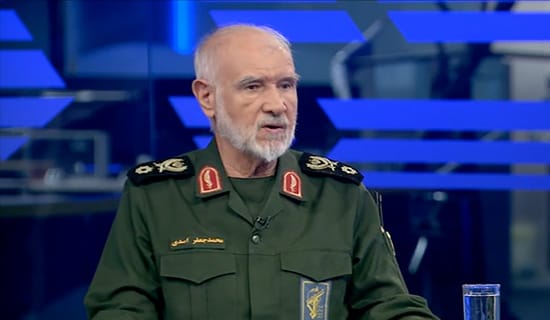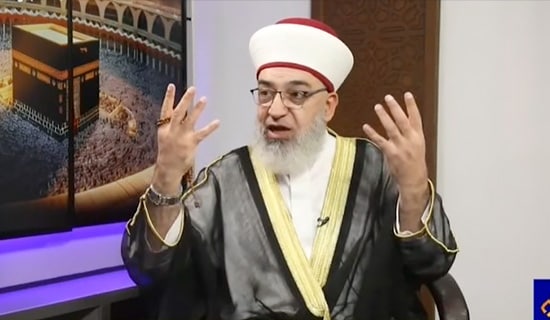
Following are excerpts from an interview with
Interviewer: Umm Nidal is a woman who voluntarily sacrificed her sons for the sake of resisting the occupiers. This woman always declared loud and clear: My sons did not commit suicide. My sons went and fought. None of them intended – even accidentally – to kill civilians, children or the elderly. They all resisted and confronted the enemy. They had achievements and they were martyred.
Umm Nidal is with us today, because she is presenting herself to the world in a new capacity, as a candidate for the Palestinian Legislative Council.
[...]Umm Nidal: I protect my sons from defying Allah, or from choosing a path that would not please Allah. This is what I fear, when it comes to my sons. But as for sacrifice, Jihad for the sake of Allah, or performing the duty they were charged with - this makes me happy.
Interviewer: What duty is this?
Umm Nidal: The sacred duty, Jihad for the sake of Allah. It is a sacred duty - one of the duties of Islam, which cannot be abandoned. We would be sinners if we did.
[...]
I prepared all my sons for jihad for the sake of Allah, whether by carrying out an attack, or by any other form of Jihad. I prepared myself for this. He who chooses a difficult road must be ready to bear the consequences.
[...]
Some people may consider this a tragedy, but by Allah, it is a blessing. When I hear about Muhammad's martyrdom...
Interviewer: Tell me about the operation that Muhammad carried out.
Umm Nidal:Allah be praised, his operation was a large and successful one – one of the most successful operations of the first and second Intifadas.
[...]
Interviewer: Thousands of viewers, sitting at home, are worried that they are about to hear that Muhammad went to blow himself up among civilians - women and children. I'm sure that they are waiting to learn what Muhammad did. Did he set out to kill children, women and civilians - or what? In such a case, he might lose their sympathy. Go ahead.
Umm Nidal: Muhammad carried out his operation at a military academy. They were all soldiers. But on the issue of women and children - no one should blame us. These are war necessities.
We have never targeted women or children, but if they come in the way of an operation - it is considered a war necessity.
[...]
He cut the fence with a pair of cutters and entered with his weapon. Death lay in wait for him everywhere...
Interviewer: So he did not blow himself up?
Umm Nidal: No, this was not a bombing operation. He carried a regular weapon – a Kalashnikov – and hand grenades. He went in. There were several rooms. He went from room to room and shot them. He continued for 22 minutes, during which he was in total control - until he ran out of ammunition. If he had had more ammunition, he would, of course, have kept fighting.
[...]
Allah be praised, there were many casualties. About ten soldiers (were killed), but the Israeli radio always conceals their casualties.
The operation was very successful, Allah be praised. Ten soldiers were killed and 23 injured.
Interviewer: The fatalities of the occupying enemy are more important to you than your own loss - and I don't mean this negatively. But you focus on the operation's outcome, not on your son's life.
Umm Nidal: Of course. I was hoping he would be martyred. If he had come back... True, there was no coming back from this operation. Martyrdom was inevitable in this operation. He entered the settlement, and there was no way he could have come out. His martyrdom was inevitable.
I waited impatiently to hear the operation's outcome. I had not even hoped that he would kill more than two soldiers. When a martyrdom-seeker enters a settlement, it's a triumph in itself. It is a very difficult thing to do. The settlements are heavily fortified. It is difficult for a martyrdom-seeker to enter them.
When I heard the outcome of the operation... True... True, I was sad about my son. This is something that cannot be ignored.
Interviewer: Did you cry?
Umm Nidal: At first I did not cry. I said "Allah Akbar" and bowed in gratitude. The truth is I was ashamed to say: "Allah, help me in my tragedy," because I consider this a blessing, not a tragedy. I prepared boxes of halva and chocolates, and handed them out to his friends.
Interviewer: Excuse me, Umm Nidal, but in the West, this scene... it's not just that they do not understand this. They don't understand how a Palestinian mother can rejoice at her son's funeral, and can say "Allah Akbar" when she hears that he was martyred. Not only do they consider this peculiar, but they also criticize it. They say these Palestinian women obviously have no human feelings. In other words, no mother in the world – no matter how noble the cause or how successful the outcome – would react in such a way. Much has been written about you and all the Palestinian mothers. They cannot understand such emotions.
Umm Nidal: They are completely detached from Islam and its concepts. But we, Allah be praised, are devout Muslims. In these matters, there is a big difference between us and them. They do not understand what Islam is...
Interviewer: But human beings are all the same. Our Lord created one kind of Man.
Umm Nidal: Of course, and as a human being, I feel these emotions very deeply. Believe me, when it comes to my sons, I am one of the most compassionate mothers. But this is a sacred duty, which no emotion whatsoever can supersede.
Interviewer: Is it true that during the withdrawal...
Umm Nidal: We cannot stop sacrificing just because we feel pain. What is the meaning of sacrifice? One sacrifices what is precious, not what is of little value. My children are the most precious thing in my life. That is why I sacrificed them for a greater cause - for Allah, who is more precious than them. My son is not more precious than his God, he is not more precious than the places holy to Islam, and he is not more precious than his homeland or his Islam. Not at all.
[...]
Interviewer: Some people say: Why do you prepare your sons for death, when you could be preparing them for life? I don't mean life in the sense of pleasure, but perhaps they could do more in their lives than in their deaths. When these people see these young men, they say they might have been great military commanders or...they might have become great minds that could cause many more casualties than were caused by throwing their lives to perdition.
Umm Nidal: But he is not throwing himself to death or to perdition. This is not death. This is not called death. It is called martyrdom.
[...]
Interviewer: Recently, many operations have been carried out in restaurants and commercial centers. The world regards them very differently than operations against the military. When a bombing takes place in one of those places, the Palestinian cause is damaged worldwide.
In Palestine itself - in Gaza and in the West Bank – people are divided over these operations.
Umm Nidal: All the Palestinians share the same view. They are not divided. The only ones who disagree and think otherwise are, of course, the foreigners, who have no sympathy for us or for our cause, and who know nothing about us. They are the ones who think that this man has come to kill innocent people. This is what they think. But we, as Muslims, think differently. We are familiar with the Koranic verse: "One who attacks you, attack him in like manner."
These are war necessities. How can we win otherwise? It's true we carry out operations against the military and its soldiers, but (killing civilians) is a war necessity. They are all occupiers to begin with. Whoever comes from abroad and lives on the land of Palestine is considered an occupier, even if they are women or old people. They are all occupiers. Besides, don't forget that they all serve in the army. They are all considered soldiers. They are all reserve soldiers.
In addition, these people... You know this land belongs to someone else, so how can you come and live on it? Therefore, all Israelis are considered occupiers of our land. There is no difference between men and women...
Interviewer: But Umm Nidal, there are many...
Umm Nidal: They are all occupiers, and we must fight them by any legitimate means.
Interviewer: "Legitimate" is the word I was looking for...
Umm Nidal: All means are legitimate as long as the occupation continues.
[...]
Interviewer: Can't you distinguish between operations against civilians and against soldiers, even from a psychological point of view?
Umm Nidal: There is no difference. This is Islamic religious law. I don't invent anything. I follow Islamic religious law in this. A Muslim is very careful not to kill an innocent person, because he knows he would be destined to eternal Hell. So the issue is not at all simple. We rely on Islamic religious law when we say there is no prohibition on killing these people.
[...]
Interviewer: What does the word "peace" mean to you?
Umm Nidal: The word "peace" does not mean the kind of peace we are experiencing. This peace is, in fact, surrender and a shameful disgrace. Peace means the liberation of all of Palestine, from the (Jordan) to the (Mediterranean) Sea. When this is accomplished – if they want peace, we will be ready. They may live under the banner of the Islamic state. That is the future of Palestine that we are striving towards.
Interviewer: Some say this kind of reasoning is the obstacle to peace, because the Israelis will never agree to be banished...
Umm Nidal: Let them refuse. We do not expect them to accept this. These people are occupiers, and we want to banish them from our land.
[...]
Interviewer: Umm Nidal, who sits here in front of me, is classified as a terrorist throughout the world. Not just a terrorist, but also as a producer of terrorists...
Umm Nidal: They can classify as much as they like. I am proud and honored to be a terrorist for the sake of Allah. "Prepare for them whatever force and steeds of war you can, in order to strike terror in the hearts of the enemy of Allah and of your own." I am happy to implement this Koranic verse myself, and to be a terrorist for the sake of Allah.
[...]
Interviewer: You have ten sons.
Umm Nidal: Yes, Allah be praised.
Interviewer: If another is killed...
Umm Nidal: There are many young men...
Interviewer: Will your heart be filled with unbearable sorrow?
Umm Nidal: No, no. Allah be praised, I am preparing myself. I will sacrifice them all. If my duty requires me to sacrifice them all, I will not refuse - even if it costs me a hundred sons.

















